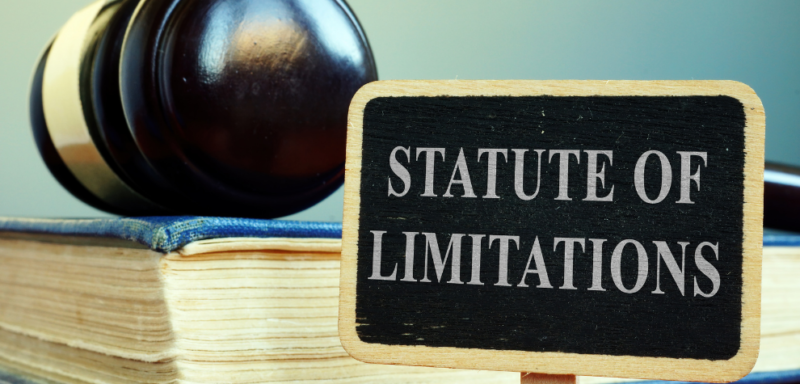The Louisiana statute of limitations, also known in this state as “prescription,” originated in Roman law. Today, these statutes are a huge part of both civil and criminal law in the United States and around the world.
Statutes of limitations are legislations in place that limit the amount of time a plaintiff has to file a case against a defendant. This provides an avenue for plaintiffs pursuing damages, while also providing protections for defendants. Without time limits, for example, defendants risk being sued at any time indefinitely, which can limit opportunities and growth for businesses in particular. Statutes of limitations also affect a prosecutor’s ability to bring a criminal prosecution against a defendant. The individual charged can have the case dropped if the prosecution charges them after the set time period passes.
Another reason we use time limits is to lessen the amount of uncertainty in our court system. Evidence can be lost, damaged, or compromised if it is left unattended for an extended period of time. In addition to affecting the plaintiff and defendant, compromised evidence also impacts how the public sees the court’s ability to resolve complex legal problems.
If you have been charged with a crime or if you would like to pursue a lawsuit for damages to your property, you need the help of an experienced Shreveport Bossier City attorney to ensure you file within the statute of limitations for your case.
What is a Statute of Limitations?
Think of a statute of limitations like a deadline for a college paper. If you fail to write your paper in time and miss your deadline, there are likely very few circumstances in which your professor may let you turn it in. The same works with statutes of limitations. If you miss the deadline for filing a lawsuit or pressing criminal charges, you may be stopped from pursuing legal action.
The cause of action (the reason you’re submitting a claim) determines the length of the statute of limitations. This may be a vehicle accident, injury at work, property damage, etc. You’ll need to figure out when the clock starts ticking after you know what the statute of limitations is for your particular case. This usually starts on the date you were injured, had property damage, or had a broken contract or agreement. This is also known as the “date of harm.”
Keep in mind that there is an exception to this rule. In some cases, when they are unaware that they have been harmed, plaintiffs may be protected. This protection can last for months or even years. In such circumstances, the clock begins ticking on the “date of discovery” of the harm or on the date which the plaintiff should have discovered the harm. In other words, the statute of limitations for various types of legal actions starts running at different times depending on a variety of different circumstances, including:
- The date the injury, harm, or damage occurred.
- The date the plaintiff can reasonably be expected to have noticed the injury or damage. This is the date when a judge finds it reasonable to believe that the plaintiff should have known about the harm, even if the plaintiff did not know about it.
- The date on which the plaintiff becomes aware of the injury, harm, or damage.
Due to the complexity of the law and various statutes of limitations in Louisiana and when they apply, a free initial consultation with a Shreveport/Bossier City lawyer is the best way to make sure you understand your individual time constraints and protect yourself.
What Cases Require a Statute of Limitations in Louisiana?
In most circumstances, statutes of limitations apply. The length of time a statute of limitations allows varies based on the type of offense. Statute of limitations Louisiana often applies in civil cases and criminal offenses. However, in cases involving major crimes, such as murder charges, there is no statute of limitations and the time for which to file charges typically has no endpoint. In most cases, serious offenses punishable by death or life imprisonment often have no statute of limitations.
Sometimes controversy surrounds the statute of limitations in a case because legal action against an offender can’t be taken after time has run out. Supporters of these time limits believe it is fairer for all when the ability to take legal action is only allowed for a specified amount of time. This is because important evidence may be lost over the years and witnesses’ memories become less reliable. Others believe that if an offender was guilty at one point, it shouldn’t matter how much time has passed to serve justice. Despite arguments on both sides of the matter, statutes of limitations that are currently in place do not seem to be going anywhere any time soon.
Civil vs. Criminal Statutes of Limitations
Civil and criminal proceedings have various statutes of limitations in Louisiana. Personal injury lawsuits, medical negligence, and breach of contract are all instances of civil actions or suits. Civil suits have time limits ranging from one to ten years, depending on the case type.
In instances of statutes of limitations for criminal charges, these also vary. Some crimes have long periods of time where legal action may be taken, while others have no statute of limitations at all due to their severity.
Statute of Limitations Louisiana Civil Lawsuits
As we’ve learned, statutes of limitations vary from state to state and are essentially time limits for launching a lawsuit or other civil action. States often have varying limits set for different types of civil proceedings as well as for pursuing a criminal procedure.
These limitations keep people from holding the threat of a lawsuit over someone’s head indefinitely and protect the integrity of the evidence. This includes witness testimony, physical evidence, and other forms of discovery.
We’ll list each of the statutes of limitations (Louisiana) for civil lawsuits by case type below.
LA Civ. Code § 3493.1
This is also known as the statute of limitations Louisiana for property damage.
This regulation is codified in Louisiana Civil Code Article 3493.1, which acts as a blanket statute of limitations Louisiana for most tort and injury lawsuits in the state. This law states: “Delictual actions are subject to a liberative prescription of two years. This prescription commences to run from the day injury or damage is sustained.”
However, the law goes on to say that this time limit does NOT apply to minors or people who are legally declared unable to make decisions if the case involves a permanent disability caused by a defective product under Louisiana’s product liability laws.
In other words, whether your potential case involves damage to real property or personal property, you generally have TWO YEARS to file it in Louisiana’s civil court system. This means that if a homeowner in Louisiana wants to file a lawsuit for physical damage to their land or the exterior of his or her home caused by someone else’s negligence, it must be done within one year. A Louisiana vehicle damage claim following a car collision is the same way.
Further, the following events or criminal actions have these statutes of limitations:
Louisiana Personal Injury Claims
2 years
Injury to Personal Property
2 years
Professional Malpractice
1 year after the date of discovery but no more than 3 years from the date of the malpractice incident, no matter when it was discovered
Fraud
1 year
Libel/Slander
1 year
Trespass
1 year
Collection of Rents
3 years – Civ. Code § 3494(3)
Collection of Debt On Account
3 years – Civ. Code § 3494(4)
Monetary Judgments
10 years – Civ. Code § 3501

Statute of Limitations Louisiana Criminal Proceedings
Compared to civil suits, violent crimes have lengthier statutes of limitations in Louisiana and most other states. Some offenses, such as a crime punishable by life imprisonment or the death penalty, have no statute of limitations at all. This means a district attorney has the authority to charge certain crimes at any given time. The government gets more time to prosecute a case when the limitations are suspended or “tolled” (more on that later).
The following list is only a partial summary of the statute of limitations for murders and certain other criminal charges:
Violent Crimes
- There is no time limit for murder
- Six years after the crime of manslaughter in Louisiana
- Four to six years after the crime of negligent homicide, depending on the possible punishment
Sex Offenses
- There is no time limit for first degree rape or second degree rape
- 30 years after the victims turns 18 years of age for specific sex crimes involving a victim younger than 17
- Six years after the crime of third-degree rape
Theft Crimes
- Six years after the crimes of armed robbery, first-degree robbery, or carjacking
- Six years after the crime of felony theft of $25,000 or more
- Four years after the crime of felony theft of $1,000 to $25,000
- Two years after the misdemeanor crime of theft of less than $1,000
What is Tolling?
The clock on a statute of limitations generally starts counting down the day after a crime is committed. However, under certain circumstances, Louisiana law allows the time period to be “tolled” or extended. That means the time period will not begin until a later date, and a limitations period can last years longer than it would otherwise.
Certain sex crimes against minors, for example, have a 30-year statute of limitations. However, that time period does not begin until the victim reaches the age of 18.
Furthermore, any statute of limitations period is tolled if a defendant flees Louisiana or is absent from their normal home in order to evade detection, apprehension, or prosecution.
Get Help With Your Case Before the Statute of Limitations Runs Out!
There are several different filing deadlines in Louisiana, and it can be hard to keep up with them. The civil statute of limitations in Louisiana varies depending on the facts of the case and the type of claim. However, the criminal statutes of limitations may be much longer or even nonexistent for criminal charges.
It’s in your best interests to call a Shreveport/Bossier City attorney as soon as possible if you have a civil suit to pursue or if you are facing criminal charges in Bossier City or the surrounding areas. Your lawyer can tell you what the statute of limitations is for your case and subsequently represent you throughout your case’s duration. Call Shreveport/Bossier City attorney Michael J. Vergis today for a free consultation at (318) 698-3724.



